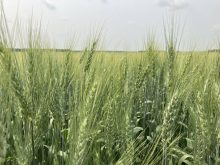It may finally be happening.
A number of analysts think oilseeds markets are in a trend that will
boost prices from their lingering lows of the past few years.
“The whole world marketplace on vegoils is going up,” said Errol
Anderson of Pro Market Communications, a Calgary company that helps
farmers market grain.
Oil World magazine, a German publication that covers the world
vegetable oil industry, says in recent articles that oilseed production
and stocks are dropping in many areas.
Read Also

Canada-U.S. trade relationship called complex
Trade issues existed long before U.S. president Donald Trump and his on-again, off-again tariffs came along, said panelists at a policy summit last month.
Palm oil stocks in Malaysia have fallen sharply and production this
year is expected to be significantly down, the magazine says. European
Union canola production is up from last year, but down from earlier
projections. European canola crushers will have to compete for supplies
already expected to be short because of problems in Western Canada and
Australia.
As well, Oil World expects the EU to import soybeans and sunflower
seeds because of the supply shortfall.
At the same time, demand is increasing, leading to lower inventories
around the world and opening the door to higher prices.
“World consumption of eight vegetable oils will be exceeding production
this season, enforcing a sharp reduction of stocks …. New crop
oilseed prospects have deteriorated in Canada, the U.S.A., Russia,
Ukraine and Europe,” Oil World said.
“It is very likely that world supplies will be tight in 2002-03,
enforcing high prices.”
Benson Quinn-GMS analyst Ken Ball said he thinks canola prices can
still catch fire Ð and should.
Canola has gained a premium compared to soybeans, but with a four
million tonne crop now possible instead of an average crop of 5.6 to
5.8 million tonnes, it should become even stronger.
“We’ve got to ration out demand,” Ball said.
Anderson agreed.
“I believe we can go higher in canola. We’ve started to push $8 (per
bushel) in top end bids for both old crop and new crop canola. Crushers
and exporters are going to have to scrap for the crop.”
Basis levels will become “super” for the farmer, Anderson said.
That could be destroyed if soy and palm oil prices fall, but it’s not
likely.
Anderson thinks recent November futures prices of about $365 could rise
to $374.
Because the outlook is so rosy right now, there’s no compelling need to
lock in new crop prices yet.
“There’s going to be a lot of demand down the road. Basis levels will
be good,” he said.
“Farmers are in the driver’s seat right now. The industry isn’t. That’s
a change.”















